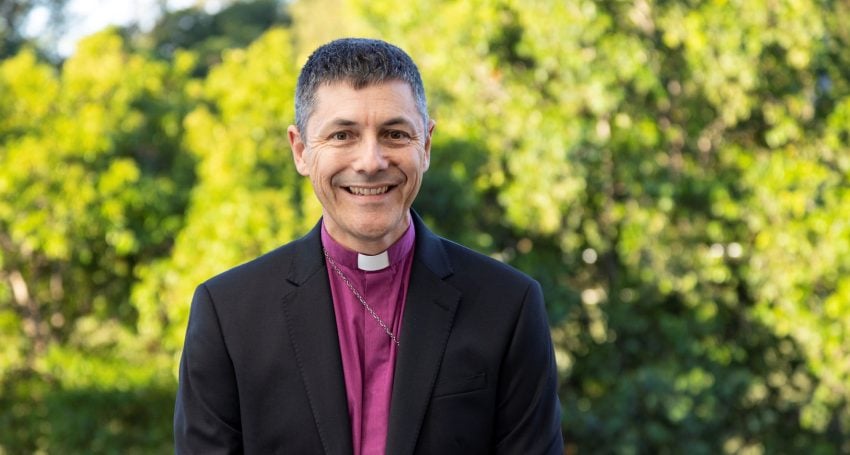Creeds and controversies
Reflections
“About 13 years ago, while serving as the Dean of Darwin, I said during an ABC Radio National interview that, ‘I’d be happy to abandon the creed.’ This comment inadvertently made for a terrific headline and clickbait. With the wisdom of hindsight, I would express myself differently,” says Bishop Jeremy Greaves

About a fortnight ago, I was talking to a parishioner during a Sunday visit. He told me about his practice of using the Bible devotional Every Day with Jesus alongside his morning prayers. He said he recently encountered a particular Scripture verse in the day’s reflection “as if for the first time”, remarking that:
“I’ve known that verse almost my whole life, but last week I understood it in a way that I’ve never considered before.”
This is, of course, one of Scripture’s greatest gifts. There is always more to learn, always more depths to explore. It’s why I am forever buying new Bible commentaries – different authors bring different scholarship, different experiences and different insights. There are regular moments for me when I read a familiar verse “as if for the first time”.
I wonder how many of you believe all the same things that you did when you were a child? As you did 10 or 15 years ago? Even five years ago?
In John’s Gospel (16.12-13), Jesus says:
“I still have much to tell you, but you cannot yet bear to hear it. However, when the Spirit of truth comes, He will guide you into all truth. For He will not speak on His own, but He will speak what He hears, and He will declare to you what is to come.”
This suggests to me that we are always on a journey into truth. Through our intellect and reason, through our tradition’s wisdom, and through praying and reflecting on the Scriptures, the Holy Spirit leads us into truth.
Advertisement
About 13 years ago, while serving as the Dean of Darwin, I said during an ABC Radio National interview that, “I’d be happy to abandon the creed.” This comment inadvertently made for a terrific headline and clickbait.
With the wisdom of hindsight, I would express myself differently. At the very least I would unpack the nuances of what I meant regarding the challenges of including the Creed in our regular worship services. This is especially given that the then-Dean of Darwin had no idea that six years later he’d be a Bishop and that his words might carry more weight – or at least spark more interest.
While ritually saying the Creed together in services is important, it’s more important that we first demonstrate what the Creed means from the moment we arrive to worship. This means being welcoming and inclusive of everyone as soon as they set foot on church grounds. The challenge before us, regarding including the Creed in our worship services, is being consistent with what we say and do – in Christian speak, it’s about “walking the talk”.
Advertisement
The Nicene and the Apostles’ Creeds are central to our understanding of the Christian faith. However, they are dense theological statements that demand careful unpacking if they are to be properly understood. They also tell us nothing of Jesus’ ministry or teachings. As Thomas Cranmer would have us do with the scriptures, we should, “heare them, read, marke, learne, and inwardly digest them”, so that each time we come to them we might proclaim them as if for the first time.
And, when used inappropriately, the Creeds can become just an intellectual exercise and distract us from living out our faith
When I reflect on the Creeds’ limitations, I’m reminded again of blind Bartimaeus who regains his physical eyesight, is freed to follow Jesus, and follows him on the way, no longer excluded, shut out, or labelled as other…no longer sitting alone by the side of the road, but traveling on it with a band of companions.
A man from the margins, separated from the community, alone and in poverty, is invited in. He’s not asked to sign up to a creed or a great list of doctrines, he’s healed and invited in.
New Testament scholar Stephen Patterson (2018) recently argued that the first Christian creed was not a proclamation of separation from others (believers from non-believers) – the sort of thing that might be used as a divisive “weapon”. Rather, he says, it was a declaration of human solidarity. This creed was part of the very first baptismal liturgies of the Early Church:
“For you are all children of God in the Spirit.
There is no Jew or Greek;
There is no slave or free;
There is no male and female.
For you are all one in the Spirit.” (Galatians 3.26-28)
He insists that Christianity was successful because it imparted a vision of unity in a deeply divided world, calling people to a new identity. He writes:
“We human beings are naturally clannish and partisan: we are defined by who we are not. We are not them. This creed claims that there is no us, no them. We are all one. We are all children of God.”
Not only did the first Christians proclaim these words from Galatians, they practised them in their communities. They developed habits of including others, of breaking down barriers, of eating with and befriending those they once found objectionable or considered to be outcasts.
Reflecting on the Early Church, I feel compelled to prayerfully wrestle with the Bible’s meaning and to explore its mysteries. And, I feel the Holy Spirit’s invitation to go deeper into understanding the Gospel’s call on my life and the place of the Creeds in the life of the Church.






